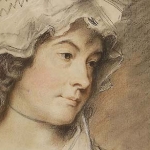[Disillusion with the French Revolution]
So many years have passed,
Since, on my native hills, I learned to gaze
On these delightful landscapes; and those years
Have taught me so much sorrow, that my soul
But, in dark retrospect, dejected dwells
On human follies, and on human woes.—
What is the promise of the infant year,
The lively verdure, or the bursting blooms,
To those, who shrink from horrors such as war
Back on the past they throw their mournful looks,
And see the Temple, which they fondly hoped
Reason would raise to Liberty, destroyed
By ruffian hands; while, on the ruined mass,
Flushed with hot blood, the Fiend of Discord sits
In savage triumph; mocking every plea
Of policy and justice, as she shows
The headless corse of one, whose only crime
Was being born a Monarch—Mercy turns,
From spectacle so dire, her swollen eyes;
And Liberty, with calm, unruffled brow
Magnanimous, as conscious of her strength
In Reason’s panoply, scorns to distain
Her righteous cause with carnage, and resigns
To Fraud and Anarchy the infuriate crowd.—
What is the promise of the infant year
To those, who (while the poor but peaceful hind
Pens, unmolested, the increasing flock
Of his rich master in this sea-fenced isle)
Survey, in neighboring countries, scenes that make
The sick heart shudder; and the man, who thinks,
Blush for his species? There the trumpet’s voice
Drowns the soft warbling of the woodland choir;
And violets, lurking in their turfy beds
Beneath the flowering thorn, are stained with blood.
There fall, at once, the spoiler and the spoiled;
While War, wide-ravaging, annihilates
The hope of cultivation; gives to Fiends,
The meager, ghastly Fiends of Want and Woe,
The blasted land—There, taunting in the van
Of vengeance-breathing armies, Insult stalks;
And, in the ranks, “Famine, and Sword, and fire,
Crouch for employment.”



















Comment form: